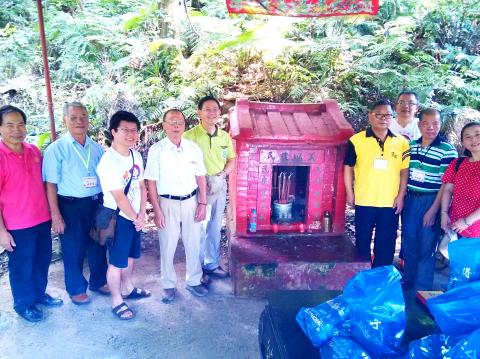An Yimin temple recently discovered in New Taipei City’s Sansia District (三峽) could be related to an uprising against the Japanese colonial government in 1895, the city’s Department of Hakka Affairs said.
The temple is on a small mountain path on Yuanshan (鳶山) and, according to research conducted by Jianguo Elementary School teacher Chen Chung-yu (陳仲宇) in Taoyuan, it is the only Yimin (“righteous people,” 義民) temple in the district.
Sansia has traditionally been considered a Minnan region, while Yimin temples belong to Hakka belief, Chen said.

Photo courtesy of Chen Chung-yu
The Yimin belief is thought to stem from deified Hakka warriors who died putting down rebellions in Taiwan for the Qing Empire or during a rebellion against Japan following the ceding of Taiwan under the Treaty of Shimonoseki. Although Yimin belief is unique in the deification of Hakka fighters, it has been conferred upon Hakka, Minnan and Aborigines by the Qing Dynasty.
Chen said the architectural style of the temple is decidedly late Qing, and the couplets on the temple, “Our uprising heralds the new age, but the people reminisce the lands of old,” imply that its construction came on the verge of political change.
The temple is close to the site of the Victory of Fenshuilun (分水崙), where Japanese troops were ambushed by primarily Hakka fighters, Chen said, adding that it could mean the temple commemorated people who died in the battle.
The battle was part of the Japanese takeover of Taiwan in 1895, when Japanese troops put down a rebellion by the Republic of Formosa established by the gentry after the First Sino-Japanese War to protest the ceding of Taiwan.
Chen said that the temple is considered a bao zhong Yimin temple (褒忠義民廟), a specific type of temple reserved for those of Hakka heritage, but the owner of the plot of land on which the structure stands said that the temple was built in 1910 by Fukienese.
Department of Hakka Affairs Director Lai Chin-ho (賴金河), academics studying Yimin belief and local history and culture enthusiasts visited the temple, hoping to find more information.
Prior to the discovery of the temple, the earliest known Hakka presence in the district was between 1912 and 1926 when they first moved into today’s Wuliao (五寮) and Jinmin (金敏) townships to cultivate tea, Lai said.
However, the discovery of the temple suggests it is possible that there were Hakka in Sansia during the early Japanese colonial era when anti-Japan rebellions were rife, Lai said, adding that this was a significant discovery for Hakka history in the district.
If research confirms Chen’s theory and the landowner agrees to subsequent development, the department would ask for funding from the central government to turn the area into a tourist site, Lai said.

A preclearance service to facilitate entry for people traveling to select airports in Japan would be available from Thursday next week to Feb. 25 at Taiwan Taoyuan International Airport, Taoyuan International Airport Corp (TIAC) said on Tuesday. The service was first made available to Taiwanese travelers throughout the winter vacation of 2024 and during the Lunar New Year holiday. In addition to flights to the Japanese cities of Hakodate, Asahikawa, Akita, Sendai, Niigata, Okayama, Takamatsu, Kumamoto and Kagoshima, the service would be available to travelers to Kobe and Oita. The service can be accessed by passengers of 15 flight routes operated by

Alain Robert, known as the "French Spider-Man," praised Alex Honnold as exceptionally well-prepared after the US climber completed a free solo ascent of Taipei 101 yesterday. Robert said Honnold's ascent of the 508m-tall skyscraper in just more than one-and-a-half hours without using safety ropes or equipment was a remarkable achievement. "This is my life," he said in an interview conducted in French, adding that he liked the feeling of being "on the edge of danger." The 63-year-old Frenchman climbed Taipei 101 using ropes in December 2004, taking about four hours to reach the top. On a one-to-10 scale of difficulty, Robert said Taipei 101

Taiwanese and US defense groups are collaborating to introduce deployable, semi-autonomous manufacturing systems for drones and components in a boost to the nation’s supply chain resilience. Taiwan’s G-Tech Optroelectronics Corp subsidiary GTOC and the US’ Aerkomm Inc on Friday announced an agreement with fellow US-based Firestorm Lab to adopt the latter’s xCell, a technology featuring 3D printers fitted in 6.1m container units. The systems enable aerial platforms and parts to be produced in high volumes from dispersed nodes capable of rapid redeployment, to minimize the risk of enemy strikes and to meet field requirements, they said. Firestorm chief technology officer Ian Muceus said

MORE FALL: An investigation into one of Xi’s key cronies, part of a broader ‘anti-corruption’ drive, indicates that he might have a deep distrust in the military, an expert said China’s latest military purge underscores systemic risks in its shift from collective leadership to sole rule under Chinese President Xi Jinping (習近平), and could disrupt its chain of command and military capabilities, a national security official said yesterday. If decisionmaking within the Chinese Communist Party has become “irrational” under one-man rule, the Taiwan Strait and the regional situation must be approached with extreme caution, given unforeseen risks, they added. The anonymous official made the remarks as China’s Central Military Commission Vice Chairman Zhang Youxia (張又俠) and Joint Staff Department Chief of Staff Liu Zhenli (劉振立) were reportedly being investigated for suspected “serious